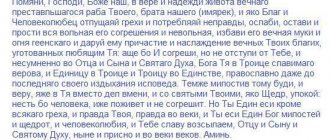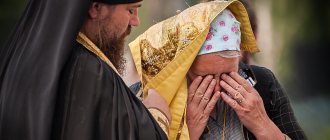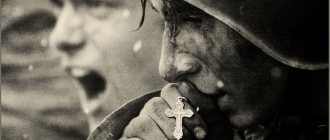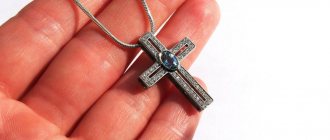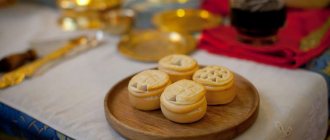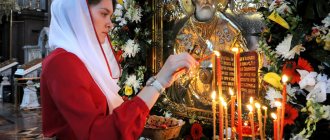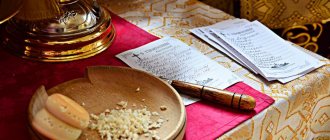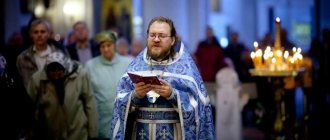When the Lord was hanging on the cross, the thief crucified on the right turned to Him: “Lord, remember me in Thy Kingdom.”
There was so much repentance, humility and faith in these words that Christ immediately forgave this man’s sins. “Today you will be with Me in Paradise,” the Savior said in response. What happened? Why did the robber, who committed many evil deeds and deserved hellish torment, end up in Paradise? The Lord forgave him for his sins. Roughly the same thing happens at the Liturgy, when people submit notes with names to remember both the health of the living and the repose of the dead.
Named particles taken from the prosphora at Proskomedia are washed, transformed from wine, with the Blood of the Lord. The church asks to remember those whose names are indicated in the note. A person’s soul is cleansed through the prayers of relatives, the priest and the Church. The power of grace depends on our faith and love for the one for whom we pray.
Prayer as a connection with God
Sorokoust about health is a type of Orthodox prayer. It is impossible to imagine the life of Christian believers without prayer. Believers resort to prayer under various circumstances, be it sorrow or joy. According to the works of Saint Ignatius Brianchaninov (1807-1867), prayer is “the offering of our petitions to God,” “the greatest virtue, a means of uniting a person with God,” “communion of life,” “the door to all spiritual gifts,” “the highest exercise for the mind.” ", "head, source, mother of all virtues"; she is the “food”, “book”, “science”, “life” of all Christians.
The need for prayer (communication with God) lies in the desire to find lost bliss as a result of the Fall.
Proskomedia - part of the service when the magpie is read
Thus, prayer is “the turning of a fallen and repentant person to God. Prayer is the cry of a fallen and repentant person before God. Prayer is the outpouring of heartfelt desires, petitions, sighs of a fallen man killed by sin before God... We need prayer: it assimilates man to God. Without it, man is a stranger to God. And the more one practices prayer, the more one approaches God” (St. Ignatius Brianchaninov).
This is the principle of spiritual life, on which St. John Climacus (579-649) wrote:
“When you remain in prayer for a long time and do not see fruit, do not say: I have gained nothing. For the very stay in prayer is already an acquisition; and what good is greater than this - to cleave to the Lord and remain unceasingly in union with Him.”
About enemies and ill-wishers
It is not only possible, but also recommended to order prayers for health to your enemies. This often works and helps neutralize all the evil that they direct towards a person who needs the protection of higher powers. And such rituals allow him to find peace and peace of mind. As evidenced by reviews of the magpie, ordered in three churches, it often happens that haters and spiteful critics, after intense prayers, leave a person’s life for various reasons. It happens that illnesses and all sorts of troubles happen to them. But you shouldn’t wish your enemies harm, because only God has the right to decide what is fair in this life and what is not.
What is magpie?
In Orthodox practice, there is a special daily prayerful commemoration for a certain period (40 days, 6 months, a year), which is carried out during the Liturgy. The common people call it magpie. An explanation of the historical origin of this name can be found in the work of Professor of the Moscow Theological Academy Evgeniy Evsigneevich Golubinsky, “History of the Russian Church,” Volume 2. In ancient times in Rus', church parishes in cities were divided into “magpies.” It was an analogue of modern dean districts of 40 churches. There was a folk tradition of ordering commemoration in the entire “forty” (40 churches). This is how the unofficial term “magpie” appeared. You can order such a commemoration both for health and for repose.
Prayerful remembrance (for the living or the dead) occurs during proskomedia. Proskomedia is the first part of the liturgical service, when the “substance” for Communion is prepared. At this time, a particle is taken from the prosphora (special liturgical bread). Then the priest, with a special prayer, lowers it into the Chalice with the Blood of Christ.
“Sorokoust is the most important remembrance of the Orthodox Church, both living and dead. After all, our greatest shrine is the Body and Blood of Christ, which, out of His ineffable mercy for the human race, the Lord creates at every Liturgy from simple substances (wine, water and prosphora). Therefore, one contact with such a terrible and powerful shrine is saving for the human soul. And as a result of this, the magpie can be called the main remembrance for a person - both living and deceased. After all, it is not for nothing that the clergyman prays, pouring out particles taken from the prosphora, remembering the name. So that the Lord, for the sake of His Most Pure Body and Blood, would wash, that is, forgive the sins of the people remembered here. And we – Orthodox Christians – believe that this is how it happens” (Priest Andrei Chizhenko).
Answers to frequently asked questions
- Can you submit notes for anyone? No, the Church prays for everyone: both the baptized and the unbaptized, but at the Eucharist, when pieces of the prosphora are taken out, only members of the Church are remembered, that is, the baptized.
- If you submitted a note about commemoration, but did not know that the person was not baptized. What will happen? If they did this not intentionally, but thinking that the person was baptized, then nothing will happen: neither to the person whose name was written down, nor to the one who submitted the note.
- What will happen if you remember an unbaptized person, knowing this? Nothing will happen to the one you remember. The one who did this intentionally needs to repent to the priest so as not to burden the soul with sin (otherwise, he may have to endure some kind of temptation, that is, trouble. For example, someone will deceive).
- What happens if I accidentally wrote down the name of a living person in remembrance as a deceased person? If this happened by accident, without malicious intent, do not worry. The Lord knows the intentions and deeds that they wanted to do the opposite. Therefore, it will be so: He will correct the mistake - He will remember for the health of the one who is alive.
- If, when doing magic, they deliberately remember the living for their repose? Nothing will happen to anyone against whom evil is plotted if he trusts in the Lord. Christ is stronger than demonic tricks. If a person wears a cross and prays, albeit briefly, for example, with the Jesus Prayer, then evil will return to the one who conjured it. Believe God, and nothing bad can be done to you.
Conclusion: Imagine the human soul as a vessel filled with bitter water, 40 liters. They prayed for him and replaced a liter of bitter water with the same amount of sweet water. After praying forty times, all the liquid in the vessel will be replaced by sweet liquid. But we have much more sins, and we commit them constantly, so we do not receive complete replacement of the sinful component with the given Grace. The more measures are taken to cleanse the soul, and there are many of them, the faster the effect occurs. Wanting to help someone:
- get out of trouble;
- receive healing;
- tame an evil temper;
- improve family relationships;
- To protect you from all evil, you must pray constantly.
“Sorokoust” is an intensified commemoration, that is, the Heavenly Powers are invoked 40 times (either by day or by church). But it should be remembered that the Sacrament is not magic. If a person himself hates the church, or his loved ones do not want to pray for him, but rely only on the priest, then there may not be quick results.
Sorokoust is not magic
Today, forty-day is most often understood by unchurched people as a prayer for 40 days. However, you can order a magpie for health and repose for six months or a year. The main thing is not to attach mystical meaning to this with a magic formula. Superstitions in this regard are very common, including among believing parishioners. It is believed that for “strong” prayer you need to perform a certain ritual. For example, there is a belief that it is necessary to give a magpie for health in 3 churches. Or visit 7 churches in one day.
But this overlooks the fact that prayer in church (congregational prayer)
“from the point of view of strength, it is higher, because everyone prays together: one has more strength in prayer, the other has more warmth, etc. And during these two to three hours, while the service lasts, you must be in church to pray along with everyone. What did Christ say? “For there are two or three congregations in my name, I am one among them” (Gospel of Matthew, 18:19)” (Elder Paisius the Svyatogorets, 1924-1994).
Who can I order from?
It is possible to order such an effective prayer service not only for someone else, close or stranger, but also for yourself. The clergy claim that the magpie, read in three churches, helps especially quickly when it comes to a pregnant woman or child, because such prayers reach God before others. The main thing is not only to know, but also to correctly indicate their Orthodox names.
It is not necessary, but it is highly desirable that during the period when prayer services are held, the person who ordered them regularly visits the temples of his choice. It is also believed that women are especially helped by magpies placed in nunneries, and men’s monasteries are very suitable for men.
How to read magpie at home?
At the morning prayers of every Christian there is a remembrance for the health and repose of our living and dead relatives. If an Orthodox Christian regularly reads these prayers and commemorations, then this is his most important “magpie,” read all his life.
If someone wants, in addition to this, to especially pray for their loved ones, then he can do this outside of morning prayers. Only then, if you have undertaken to read the magpie for them, then you must pray religiously for them for forty days in a row.
What is the danger
Mixing together sacred numbers, religious rituals, the Orthodox faith, myths, consumer philosophy and a person’s desire to solve all problems in one fell swoop, many swindlers offer to order seven sorokousts about health as a panacea for all mental and material adversity. People who succumb to provocations forget that in Orthodoxy the most important role is played by the internal meaning, and not by a form devoid of content.
The prayer ritual includes a request to the Almighty for spiritual help. In this case, it is assumed that the person himself will pray, realize his sins, ask for forgiveness, and through common efforts the soul will be cleansed. And the situation will change as much as the person asking is sincere in his aspirations and spiritual work.
Proskomedia or mass
What is the difference between mass and proskomedia? The Liturgy, which lasts from morning until lunch, is simply called the Liturgy, and the Proskomedia is the first part of it.
During mass, the priest reads the names and the choristers sing “It is Worthy to Eat.”
What should I order for a prayer service or proskomedia to keep loved ones healthy? It is best to get the answer from your confessor.
Procedure for holding the proskomedia
Priests prepare in a special way for the liturgy, after which Orthodox Christians can take communion, one of the seven Sacraments of the Church.
For the first part of the Liturgy, parishioners bring bread and other offerings, clergy prepare wine and special bread for communion.
The clergy put on attire appropriate to the Liturgy in order to perform a special ceremony at the altar - presenting before the Lord the people for whom their relatives and friends are asking.
The sacred rite takes place with the gates closed, in the altar, emphasizing the mystery of the coming of the Savior, invisible to many. The priest proclaims each name out loud, while saying “Remember, Lord (name).”
After reading the entrance prayers, the priest puts on festive clothes and washes his hands.
Next comes the preparation of the symbol of purity - the Lamb. For each Liturgy, 5 prosphoras are baked as a reminder of the miracle when Jesus fed 5,000 people with five loaves of bread, not counting women and children (Matthew 14:13-21)
From the first lamb prosphora, the priest cuts out the middle part in the form of a quadrangle - the Lamb.
Before the birth of Jesus Christ, according to the Old Testament, it was possible to atone for sins only by sacrificing a killed animal. Man sinned, but an innocent creature was killed. God no longer wanted the blood of innocent animals and sent His Son to earth, who became the last Lamb sacrificed for the sins of the world. Only the believer in Jesus Christ, who accepted his sacrifice for his sins, will be saved.
Taking out the middle recalls both the birth and death of Christ.
Paten, chalice, star, spear, spoon
The meaning of objects in the Liturgy
Each item used in the first part of the Liturgy has a special meaning. The paten, with the cut out middle of the first bread placed on it, symbolizes the manger in which the Savior was born, and the thunder where He was buried.
Piercing the right side of the middle of the removed piece with a spear is done in memory of how the guard pierced the right rib of Jesus, and Blood and water poured out of it.
To pour wine diluted with water, a special bowl is used - a chalice.
Next, the priest moves on to the remaining four prosphora.
From the second, the Mother of God prosphora, the middle is taken out in the form of a triangle, and the Mother of God is commemorated. The triangular part is placed to the right of the quadrangular part - the symbol of the Lamb.
From the left side of the Lamb, 9 parts of the “ninefold”, the third sacred bread, symbolizing the saints, are ironed out.
Under the “feet of the Lamb” 2 parts taken from the fourth prosphora are placed. Part of it is the living clergy, the second is all the laity of the Orthodox Church.
Part of the fifth bread is a symbol of the memory of the departed.
For reference! From the loaves given by the laity, the priest takes out as many particles as there are names written on the memorial lists. The following is a prayer for health.
Remember, Lord Jesus Christ, our God, Thy mercy and generosity from all eternity, for whose sake Thou didst become man, and Thou didst deign to endure crucifixion and death, for the sake of the salvation of those who believe in Thee; and rose from the dead, you ascended into heaven and sit at the right hand of God the Father, and look upon the humble prayers of those who call upon You with all their hearts: incline Your ear and hear the humble prayer of me, Your indecent servant, in the stench of the spiritual fragrance, which brings You for all Your people . And in the first place, remember Your Holy, Catholic and Apostolic Church, which You have provided with Your venerable Blood, and establish, and strengthen, and expand, multiply, pacify, and preserve the insurmountable gates of hell forever; Calm the tearing of the Churches, quench the pagan vacillations, and quickly destroy and eradicate the heresies of rebellion, and convert them into nothingness by the power of Your Holy Spirit. (Bow)
Save, Lord, and have mercy on our God-protected country, its authorities and army, protect their power with peace, and subdue every enemy and adversary under the nose of the Orthodox, and say peaceful and good words in their hearts about Your Holy Church, and about all Your people: yes Let us live a quiet and silent life in orthodoxy and in all piety and purity. (Bow)
Save, O Lord, and have mercy on the Great Lord and Father of our Holiness Patriarch Alexy, Your Eminence metropolitans, archbishops and Orthodox bishops, priests and deacons, and the entire church clergy, who You have appointed to shepherd Your verbal flock, and with their prayers have mercy and save me, a sinner. (Bow)
Save, Lord, and have mercy on my spiritual father (his name), and with his holy prayers forgive my sins. (Bow)
Save, O Lord, and have mercy on my parents (their names), brothers and sisters, and my relatives according to the flesh, and all the neighbors of my family, and others, and grant them Your peaceful and most peaceful goodness. (Bow)
Save, O Lord, and have mercy, according to the multitude of Your bounties, all the sacred monks, monks and nuns, and all those living in virginity and reverence and fasting in monasteries, in deserts, in caves, mountains, pillars, gates, rock crevices, and sea islands, and in every place of Thy dominion, those who live faithfully and piously serve Thee, and pray to Thee: ease their burden, and comfort their sorrow, and grant them strength and strength to strive for Thee, and through their prayers grant me remission of sins. (Bow)
Save, O Lord, and have mercy on the old and the young, the poor and the orphans and the widows, and those who are in sickness and sorrow, troubles and sorrows, conditions and captivity, prisons and imprisonments, and even more so in persecution, for You for the sake of the Orthodox faith, from the tongue of the godless, from the apostate and from the heretics, Thy present servants, and remember, visit, strengthen, comfort, and soon by Thy power I will weaken, grant them freedom and deliver. (Bow)
Save, O Lord, and have mercy on us, who are merciful and nourishing to us, who gave us alms, and who commanded us unworthy to pray for them, and who give us rest, and do Thy mercy to them, granting them all the petitions for salvation, and the perception of eternal blessings . (Bow)
Save, Lord, and have mercy on those sent to the service, those traveling, our fathers and brethren, and all Orthodox Christians. (Bow)
Save, Lord, and have mercy on them who I tempted with my madness, and turned away from the path of salvation, and led me to evil and inappropriate deeds; By Your Divine Providence, return again to the path of salvation. (Bow)
Save, Lord, and have mercy on those who hate and offend me, and those who create misfortunes against me, and do not leave them to perish for my sake, a sinner. (Bow)
Those who have departed from the Orthodox faith and are blinded by destructive heresies, enlighten the light of Your knowledge and bring Your Holy Apostles to the Catholic Church. (Bow)
After the prayer, all the particles symbolizing the people given in the notes are laid out on the paten. The created image symbolizes the unity of the Church, both earthly and heavenly, whose heart is Jesus Christ, the Lamb of God.
As in the world, the paten represents the living, the deceased, the sick, the lost - the people of the world who are so loved by God.
After the end of the Liturgy, all the pieces symbolizing the people for whom they prayed are lowered into the chalice with wine. This is a prototype of a unique action - everyone who is around Jesus will be cleansed by His Blood from all sins and will receive forgiveness.
Who cannot order
Of course, God strives to help all those who suffer. However, you should also take into account that it is necessary to prepare for the important serious ritual described with all responsibility. Firstly, the reason for filing an application should not be trivial, but still important. This remedy is usually resorted to if a person really needs help. Secondly, one should seriously prepare for the sacrament: before this, fast for nine days, cleanse oneself spiritually and live in accordance with the commandments. And only after this, ask for the magpie celebration to be held in three churches.
But that's not the only thing that matters. The clergyman has the full right to refuse a parishioner to perform a ceremony if the person for whom care is being shown practically does not attend church, does not go to confession and does not consider it necessary to receive communion. And of course, prayer services are not held for sectarians and atheists, as well as for non-Orthodox people, that is, representatives of other religions. The same applies to those people who experience rejection of God, not recognizing the influence of the Almighty on earthly life, and also ignore his commandments.
On what occasions
The Sorokoust prayer for health is considered one of the strongest rituals. He is able to provide assistance in different situations.
In what cases is a sorokoust about health ordered:
- For the recovery of sick loved ones, in case of chronic and acute diseases, before surgical interventions.
- Before childbirth.
- For diseases of children and the elderly.
- Before starting important matters of decisive importance.
- Sorokoust about health is ordered to resolve enmity (for enemies, negatively minded people).
- For yourself - for good luck, physical and mental health, success in your endeavors.
Prayer to Nicholas the Wonderworker
Saint Nicholas the Pleasant is a beloved saint who never leaves words addressed to him without a response. Prayers for health also do not go unanswered if they are said sincerely, without grumbling, with an ardent desire to receive healing, help and support. To help a loved one recover, you can turn to the saint with a prayer for your sister’s health.
O All Saint Nicholas! Intercessor and speedy helper of all the sorrowful and sick! Beg our Lord to forgive His servant (your name) for the sins that he committed out of ignorance or thoughtlessness. Ask Him to deliver your body and soul from the machinations of the devil, worldly diseases, from ordeals and eternal torment. Amen!
Other options for removing damage
From the point of view of the Orthodox religion and the church, the Holy Spirit, strong faith, strength, Holy prayer, worship of images and Holy relics can block the path of dark forces. People who believe in God can resort to the church method of removing negativity, otherwise the method does not work.
The action of holy water helps to get rid of evil influences from the outside, enemies and well-wishers; its properties have been proven by scientists. For centuries they have been helping to get rid of illnesses, evil intentions, and black deeds. Before carrying out the ritual for holy water, on one day you need to confess in church and take communion, then take holy water and drink three sips on an empty stomach for a week.
Afterwards, it is necessary to praise the Lord and ask him to protect the person and his loved ones from enemies.
A ritual in church in one day removes black negativity, brings spiritual light, a special sign, goodness into life, but there are times when the ritual does not produce results. If the negative program is powerful, induced by the ancestral sorcerer, fueled by necrotic energy, cemetery magic. To get rid of damage, you need to order magpie at the same time in three or seven churches, with the support of close relatives. Efforts will not bring results if the priest or priest violates the sequence of reading the magpie.
When performing rituals in 7 churches, you need to carefully prepare, fast, confess, take communion, and clear your thoughts. Do not tell anyone about your intentions, carry out the action in the temple. Do not lend anything to anyone, especially after sunset. Often an unexpected friend who is involved in the problems comes to the doorstep for salt, sugar and matches.
